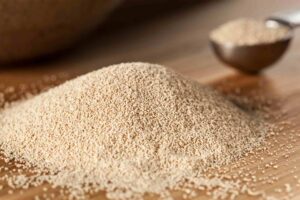An increasingly adopted strategy in animal husbandry practice is the use of feed additives to improve the immune system, with the aim of reducing the incidence of disease and obviating the indiscriminate use of antibiotics and chemotherapeutics.
The recent study from the Brazilian University of São Paulo compared the effects of β-1,3-glucans from Euglena gracilis and β-1,3/1,6-glucans from Saccharomyces cerevisiae on immune and inflammatory activities in dogs.
β-glucans
Immunomodulatory compounds can beneficially regulate the immune and inflammatory systems, thereby increasing host resistance. β-glucans have been studied for this function, with interesting results for several species. These are found in a variety of natural sources such as yeasts, fungi, bacteria, algae, barley, and oats, all with different structures and functions.
The study
Four diets were compared: control, no β-glucans (CON), 0.15 mg/kg BW/day of β-1,3/1,6-glucans (Β-Y15), 0.15 mg/kg BW/day of β-1,3-glucans (Β-S15), and 0.30 mg/kg BW/day of β-1,3-glucans (Β-S30).
Thirty-two healthy dogs (eight per diet) were organized in a block design. All animals were fed CON for a washout period of 42 days and then sorted into one of four diets for 42 days.
Blood and feces were collected at the beginning and end of the food intake period and analyzed for serum and fecal cytokines, ex vivo production of hydrogen peroxide and nitric oxide, phagocytic activity of neutrophils and monocytes, C-reactive protein, ex vivo production of IgG, and fecal concentrations of IgA and calprotectin.
Intake of β-1,3/1,6-glucan from S. cerevisiae showed cellular activation of the immune system, as evidenced by increased serum levels of IL-2 and phagocytic index of neutrophils, while β-1,3-glucan from E. gracilis acted on the immune system by increasing the ex vivo production of nitric oxide by monocytes, the phagocytic index of monocytes and neutrophils, and the serum concentration of C-reactive protein.
Calprotectin and C-reactive protein values did not support inflammation or other health problems related to the intake of β-glucan sources in the present study. In conclusion, both sources of β-glucan, S. cerevisiae and E. gracilis, have the ability to modulate immune and inflammatory parameters in dogs.
Reference
de Souza Theodoro S, Gonc¸alves Tozato ME, Warde Luis L, Goloni C, Bassi Scarpim L, Bortolo M, et al. (2024) β-glucans from Euglena gracilis or Saccharomyces cerevisiae effects on immunity and inflammatory parameters in dogs. PLoS ONE 19(5): e0304833. https://doi.org/10.1371/journal.pone.0304833







